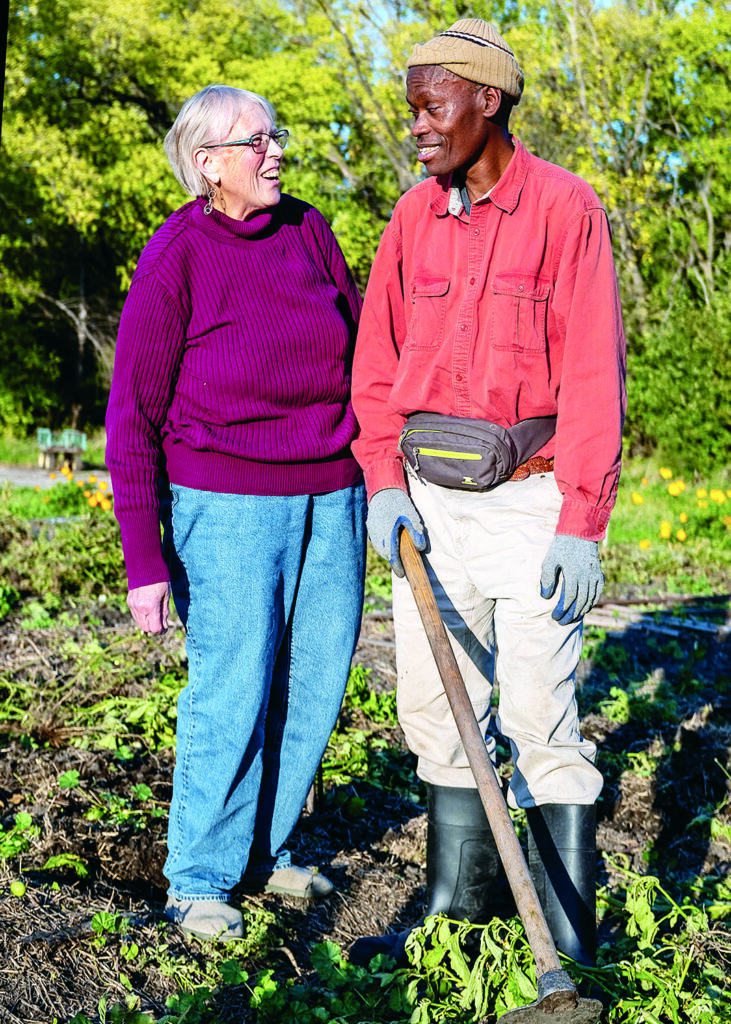moorhead business news

Verna Kragnes’s Prairie Rose Farm gives many new Americans like Simeon Bakunda (at right) a chance to apply their traditional farming methods to feed their families, as well as master the legal and commercial ins and outs of the farming business.
Nancy Edmonds Hanson
Verna Kragnes grew up on a farm 12 miles northeast of Moorhead. After a career that started in education, she circled around through community organizing, outdoor education and setting up one of the first two CSAs – community-supported agriculture – selling to the Twin Cities.
Now Verna has come nearly full circle, pulling all the threads together. Her Prairie Rose Farm, just a mile and a half from where she grew up, is helping a new generation build their own futures on the land. The 13 farmers of the New Roots Farm Incubator, though, are not quite the same as the neighbors she grew up among: They are new Americans, skilled in the indigenous and subsistence farming traditions of their native lands, but just finding their way in the world of American agriculture.
Her devotion to nurturing love of the land inspired the Minneapolis-based nonprofit Environmental Initiative to name Verna its “Critical Collaborator” of the year. According to its announcement, “Verna Kragnes is passionate about accessible, health farming. Known as a grandmother of sustainable agriculture in Minnesota, she spends her time mentoring, organizing and developing new ways to make farming and land ownership more accessible.”
Prairie Rose Farm is a dream come true for the 1968 graduate of Woolworth-Glyndon High School. After graduating from North Dakota State University in home economics, she spent five years teaching in North Dakota and Iowa, developing a fascination with experiential learning. She pursued more education in the possibilities at Pacific Oaks College and the University of Illinois Urbana-Champaign, then earned a special credential in educational administration at the University of Minnesota that prepared her to be a high school principal or superintendent. Her internship in Moorhead in the late 1970s led to a spot in the Moorhead High School administration – the first female at that level.
Then she met her husband and lifetime collaborator, Rick Hall. She resigned and went with him to Philadelphia, where her volunteering led to becoming the executive director of a shelter in the multicultural Kensington neighborhood.
The couple returned to the Twin Cities area. They fulfilled a dream of hers when they organized Philadelphia Community Farm near Marine on St. Croix. Its purpose was preservation of the natural environment, small-scale farming and education. “We were happily ensconced and expected to be there forever,” she remembers. After 28 years, though, Verna was diagnosed with stage IV non-Hodgkins lymphoma.
That was 2014, “We came back here, first to a cabin on Height of Land Lake and, that fall, to Moorhead,” she remembers. She calls her recovery amazing. “I licked cancer in six months,” she reports happily, “and I haven’t had a recurrence since.”
But once again she looked for new challenges. When she heard the local shop Prairie Yarns was closing, she organized a knitters’ cooperative along the line of a CSA to turn it into Prairie Fiber Arts Center. Her passion for sustainable agriculture, though, called her back, this time as a consultant and founding board member of Jack Wood’s Growing Together Community Gardens. Their mission: to provide plots of land where new Americans and others could grow food to feed their families and, perhaps, sell to supplement their family finances.
The gardeners eventually reorganized as the New Roots Farm Incubator Cooperative – the individuals who now plant, tend and harvest on Prairie Rose Farm and a small leased acreage north of Dilworth. Verna and husband Rick incorporated a nonprofit they dubbed PRAIRIE, an acronym for Prairie Rose Agricultural Institute for Research, Innovation, & Education. Its purpose, like all of Verna’s endeavors, is to support the development of new small-scale farmers. Besides raising their produce, participants expand their skills with training in food safety, laws and regulations, both production and economic record-keeping, and other essential skills for viable small-scale earth-friendly farming.
“If someone produces $1,000 worth of eggs, meat or vegetables in a year, they can file a Schedule F with their income taxes as a farmer,” she explains. “After filing for three years, they can access microloans through the USDA’s Farm Service Agency and possibly regular loans of up to $150,000 to buy their own land.” She foresees an opportunity to build generational wealth and, ultimately independence.
Verna says the kind of small-scale agriculture the cooperative supports is, in fact, a viable alternative to larger farms with which the region is more familiar. “Like organic farms, these are much more than hobbies or lifestyle choices,” Verna emphasizes. She repeats a statistic cited last year by U.S. Secretary of Agriculture Tom Vilsack: 89.6% of American farms need off-farm income to stay solvent. “Small-scale farming is viable. Not only that – the commodities these farmers raise are climate-smart, which is so essential to sustain our soil and our environment.
“We truly need to reorganize our food chains,” she continues. “Much more of our foods should be grown locally.”
Right now, Moorhead’s “grandmother of sustainable agriculture” is out standing in her field – literally. She’s planting and weeding her own vegetables and herbs at Prairie Rose Farm; she is currently harvesting rhubarb and herbs, but her products will expand to root vegetables and other favorites by this fall. She is helped by a paid intern and an assortment of part-time helpers, both paid and unpaid.
As she harvests her crops, they will be available through the Red River Harvest Cooperative’s online market. New Roots is among a dozen small-scale producers who market vegetables, herbs, eggs, meat and honey through the website. Customers place their orders (and meet the producers) at https://redriverharvest.localfoodmarketplace.com, paying by credit card. They can pick up what they’ve chosen in the building north of McDonald’s on Eighth Street every Wednesday from 4 to 6 p.m..

